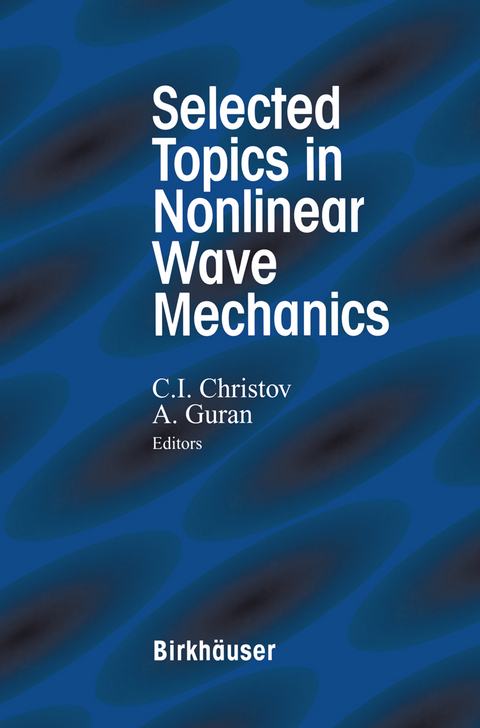
Selected Topics in Nonlinear Wave Mechanics
Springer-Verlag New York Inc.
978-1-4612-6609-9 (ISBN)
1 Elastic Surface Waves, Resonances, and Inverse Acoustic Scattering.- 1.1 Introduction.- 1.2 Waves on elastic plates: Lamb-type and Scholte-Stoneley waves.- 1.3 Acoustic Interactions Wich Ocean-Floor Sediments.- 1.4 Conclusions.- 2 Amplitude Equation Models for the Interaction of Shocks with Nonlinear Dispersive Wave Envelopes.- 2.1 Introduction.- 2.2 The Weak Coupling Limit.- 2.3 The Riemann Problem.- 2.4 The Zero Diffusion Limit.- 2.5 Dynamics Prior to Shock Onset.- 2.6 The Incompressible Limit.- 2.7 Exact Solutions.- 2.8 The ? = 0 Problem.- 2.9 The Multi-Scale Expansions.- 2.10 Modulation Equations for the Dispersive Wave.- 2.11 Analysis of the Effective Shock Equation for the Nonlinear Limit.- 2.12 Analysis of the Effective Shock Equation in the Linear Limit.- 2.13 Numerical Experiments.- 3 Some Aspects of One-Dimensional Finite Amplitude Elastic Wave Propagation.- 3.1 First Order Equations.- 3.2 Systems of First Order Equations.- 3.3 Elastic Strings.- 3.4 Problems for membranes.- 3.5 Some problems for three dimensional elastic bodies.- 3.6 Thermodynamic considerations.- 4 Nonlinear Duality Between Elastic Waves and Quasi-particles.- 4.1 Introduction.- 4.2 Hyperbolicity and Conservation Laws.- 4.3 Elasticity as a field theory.- 4.4 Solitonic systems.- 4.5 Nearly integrable systems.- 4.6 Examples from Continuum Mechanics.- 4.7 Conclusions.- 5 Time-Harmonic Waves in Pre-Stressed Dissipative Materials.- 5.1 Introduction.- 5.2 Linearized Equations in Solids.- 5.3 Constitutive Equation for Solids.- 5.4 Linearized Equations and Restrictions for Fluids.- 5.5 Propagation Condition for Inhomogeneous Waves.- 5.6 Dissipation and Wave Decay.- 5.7 A New Approach to Wave Propagation.- 5.8 Rays in Pre-Stressed Solids.- 6 Dissipative Effects on the Evolution of Internal SolitaryWaves in a t Sheared, Stably Stratified Fluid Layer.- 6.1 Introduction.- 6.2 Model system.- 6.3 Discussion.- 6.4 Conclusions.- 7 Dissipative Nonlinear Strain Waves in Solids.- 7.1 Introduction.- 7.2 Modelling of nonlinear waves in an elastic rod.- 7.3 Mathematical tools for analysis of the governing equations.- 7.4 Amplification of a strain solitary wave in a narrowing rod.- 7.5 Selection of nonlinear strain waves in an elastic rod due to the influence of an external medium.- 7.6 Influence of macro- and micro-dissipation on the formation of dissipative solitary waves.- 7.7 Concluding remarks.
| Zusatzinfo | XIII, 263 p. |
|---|---|
| Verlagsort | New York |
| Sprache | englisch |
| Maße | 155 x 235 mm |
| Themenwelt | Sachbuch/Ratgeber ► Natur / Technik ► Garten |
| Mathematik / Informatik ► Mathematik ► Algebra | |
| Mathematik / Informatik ► Mathematik ► Angewandte Mathematik | |
| ISBN-10 | 1-4612-6609-2 / 1461266092 |
| ISBN-13 | 978-1-4612-6609-9 / 9781461266099 |
| Zustand | Neuware |
| Informationen gemäß Produktsicherheitsverordnung (GPSR) | |
| Haben Sie eine Frage zum Produkt? |
aus dem Bereich


